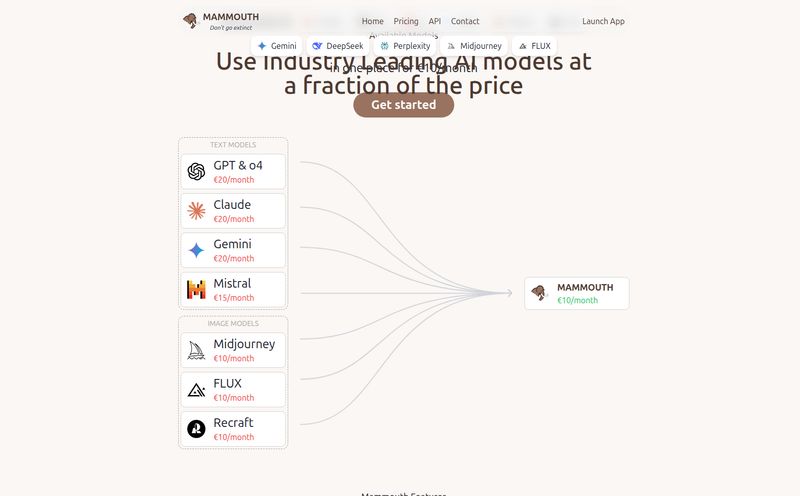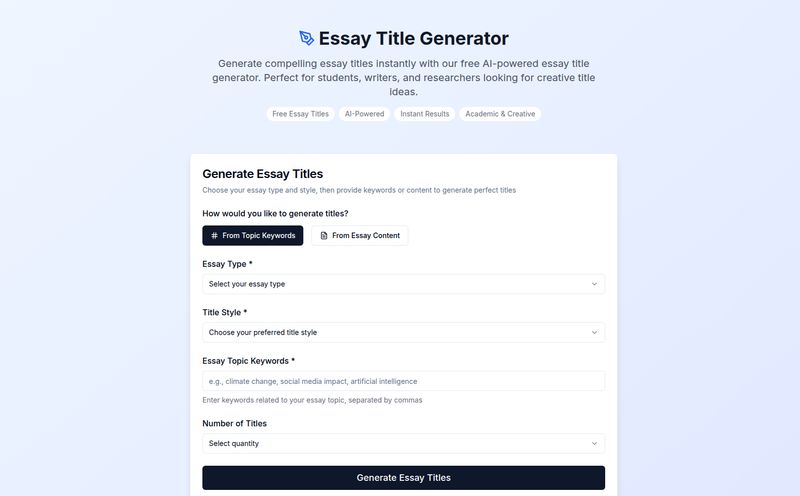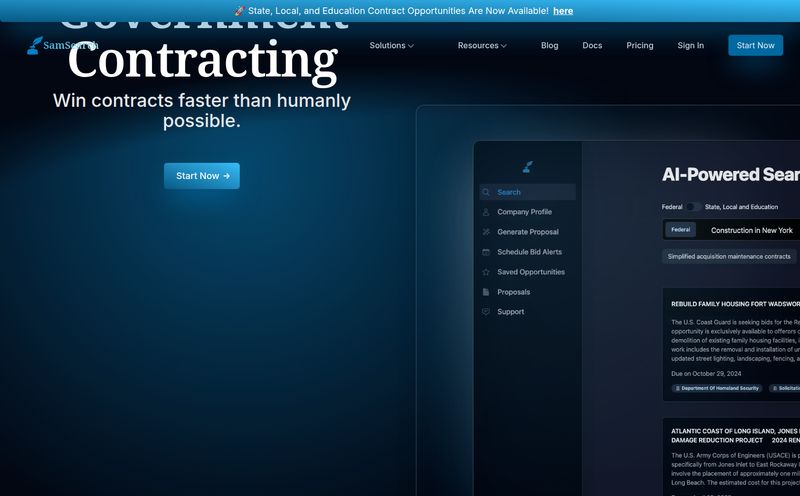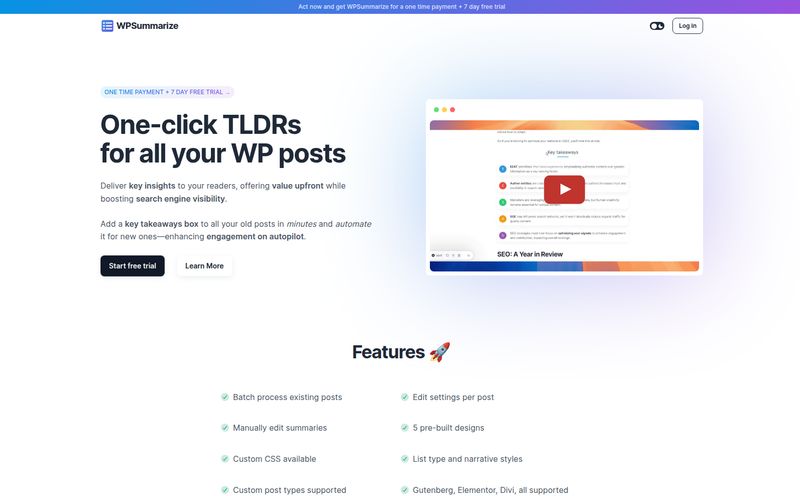It feels like every single morning I open my laptop and there are ten new AI tools vying for my attention. AI this, GPT-that, automate everything. It's a lot. And if you’re like me, a part of you is excited, and another part is just… tired. How many more AI headline generators or summary tools do we really need? It's a gold rush, and everyone's selling shovels.
But every now and then, something pops up that makes me lean in a little closer. Not just another shovel, but maybe a whole workshop. That’s the vibe I got when I first stumbled upon Cookup AI. It’s not just presenting a menu of pre-built tools; it’s handing you an apron and inviting you into the kitchen.
So, What Exactly is Cookup AI?
At its core, Cookup AI is a platform where you can both discover and create your own AI applications. Think of it like a cross between an app store for niche AI tools and a Lego set for building them. You can browse what other people have made, or you can roll up your sleeves and piece together your own custom solution for a problem that's been nagging you.
The platform is designed to serve a bunch of different fields—product management, marketing, programming, even venture capital. The big promise here is that you don’t need to be a machine learning PhD from Stanford to build something useful. That's a promise we've heard before in the no-code space, but Cookup AI's focus on sharing and distribution adds a really interesting community layer to it.
More Than Just Another AI Wrapper
Let's be real. A lot of AI tools out there are just slick interfaces slapped on top of OpenAI's API. They’re “wrappers.” And while many are useful, they aren’t fundamentally new. What intrigues me about Cookup AI is the dual focus: use and create.
It’s one thing to use an AI that writes social media posts. It's another thing entirely to build a little AI engine that specifically writes social media posts in your brand's quirky voice, referencing your specific product line, and optimized for LinkedIn's weird algorithm. That’s the potential here. It’s about moving from generic solutions to bespoke ones, without needing a full-stack developer on retainer.

Visit Cookup AI
Who is This AI Kitchen Really For?
The platform seems to be casting a wide net, which can sometimes be a red flag. But in this case, the use cases are distinct enough that I can see it working. I've always felt the best tools are the ones that adapt to you, not the other way around.
Product Managers on a Mission
Imagine needing to quickly synthesize user feedback from a dozen sources. Instead of manual copy-pasting, you could potentially build a small app on Cookup that takes raw feedback and spits out categorized pain points. A real time-saver.
Marketers Drowning in Content
From drafting ad copy variations to generating blog post ideas or even creating a persona-specific email sequence, the possibilities are obvious. As an SEO guy, my mind immediately goes to creating a tool that analyzes SERPs and suggests content angles. A custom tool for a custom strategy.
Programmers Looking for a Shortcut
Wait, programmers using a no-code tool? Absolutely. Not everything needs to be a monumental coding project. Sometimes you just need a quick script or a micro-tool to automate a repetitive task. Why spend a day building something from scratch when you can cook it up in 20 minutes?
The Good, The Bad, and The AI-Generated
No tool is perfect, especially in the fast-moving world of AI. It’s important to go in with your eyes open. Based on what I've seen and the nature of these platforms, here's my honest take.
The Bright Side of the Cookup
The biggest win is the empowerment. The user-friendly interface lowers the barrier to entry, letting creative people solve their own problems. The potential for a productivity boost is huge. Instead of searching for the perfect third-party tool, you can just build a “good enough” version yourself. Plus, the sheer variety of pre-made apps means you're likely to find something interesting to play with, which can spark your own ideas.
A Pinch of Salt is Required
Now, for the reality check. When you open up creation to everyone, quality is going to be… well, variable. Some community-built apps will be brilliant, and some will be duds. You’ll have to do some sifting. There's also the bigger, philosophical question: does relying on these tools make our brains lazy? Some might argue that. I tend to think of it like a calculator; it doesn't stop you from learning math, but it sure helps you get through your taxes faster. The key is to use it as a partner, not a crutch.
My main hesitation is that some of the more powerful custom apps might still require a bit of technical logic to set up. They might call it “no-code,” but you'll probably still need to understand how to structure a prompt or a logical flow. Don't expect to build a sentient robot with a few clicks.
Let's Talk About The Price Tag
This is the part where I'd normally break down the pricing tiers for you. But as of my last check, Cookup AI is keeping its cards close to its chest. There's no public pricing page available. What does this mean? It could be in a free beta phase to attract users, or they might be focusing on an enterprise model.
If I were to guess, I’d anticipate a freemium model down the line. Something like: a free tier for discovering and using a limited number of apps, and a paid tier for advanced creation features, unlimited app usage, and maybe private app-building for internal company use. That seems to be the standard playbook for SaaS tools these days.
The Final Verdict: Is Cookup AI Worth Your Time?
So, should you clear some space in your browser's bookmarks for Cookup AI? I’d say yes, with a caveat.
If you are looking for a single, polished, enterprise-grade AI solution for a critical business function, this probably isn't it. But if you're a tinkerer, a problem-solver, a marketer or PM who constantly thinks, “I wish there was a tool that did X…” then you absolutely need to check it out.
Think of it as an AI playground. It's a place to experiment, to build rapid prototypes, and to solve those annoying little problems that no big company will ever build a dedicated tool for. It’s for the scrappy creators and the efficiency-obsessed pros. And in my book, that makes it one of teh more interesting platforms to watch in the coming year.
Frequently Asked Questions about Cookup AI
- 1. What is Cookup AI in simple terms?
- Cookup AI is a platform where you can find, use, and even build your own simple AI applications for specific tasks, like marketing, coding, or product management, without needing to be an expert programmer.
- 2. Do I need to know how to code to use Cookup AI?
- For the most part, no. The platform is built around a user-friendly, no-code/low-code philosophy. However, to create more complex or logical apps, having a basic understanding of how systems and prompts work will be very helpful.
- 3. Is Cookup AI free?
- Currently, there is no public pricing information. The platform may be in a free beta period. It is common for such tools to eventually offer a mix of free and paid plans.
- 4. Can I share or sell the AI apps I create?
- Yes, a key feature of Cookup AI is the ability to distribute the apps you create. This allows for a community-driven library of tools where you can share your creations with others.
- 5. What kind of AI tools can I build?
- You can build a wide range of tools tailored to your needs. Examples include a custom blog post outliner, a tool to generate SQL queries from plain English, a user feedback summarizer, or a generator for social media content in a specific brand voice.
- 6. How is this different from just using ChatGPT?
- While the underlying technology might be similar, Cookup AI allows you to create a structured, repeatable application with a specific interface. Instead of typing a long, complex prompt into ChatGPT every time, you can build a tool with simple inputs and a dedicated purpose, which you can then easily share.
Reference and Sources
For further reading on the no-code and AI platform space, I find these resources insightful:



